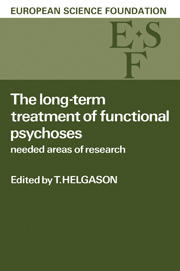Book contents
- Frontmatter
- Contents
- List of Participants
- Introduction
- I Organisational Aspects of Long-term Treatment
- II Patients Aspects of Long-term Treatment
- Needed are as of research in psychological treatments for functional psychoses
- Family therapy as part of the treatment of schizophrenia
- Milieu therapy in the long-term treatment offunctional psychoses: needed areas of research
- Long-term treatment of functional psychosis with neuroleptics
- Lithium and prophylaxis in manic-depressive illness
- New perspectives in psychopharmacology
- Research implications of recent trends in the treatment of schizophrenia
- Long-term treatment of functional psychoses in childhood and adolescence
- Functional psychosis in old age
- Chronicity and hospitalization: can the viciouscirclesbe broken?
- Social network and the long-term course of mental disorders - research needs
- III Public Health Aspectsof Long-term Treatment
- Index
Long-term treatment of functional psychoses in childhood and adolescence
from II - Patients Aspects of Long-term Treatment
- Frontmatter
- Contents
- List of Participants
- Introduction
- I Organisational Aspects of Long-term Treatment
- II Patients Aspects of Long-term Treatment
- Needed are as of research in psychological treatments for functional psychoses
- Family therapy as part of the treatment of schizophrenia
- Milieu therapy in the long-term treatment offunctional psychoses: needed areas of research
- Long-term treatment of functional psychosis with neuroleptics
- Lithium and prophylaxis in manic-depressive illness
- New perspectives in psychopharmacology
- Research implications of recent trends in the treatment of schizophrenia
- Long-term treatment of functional psychoses in childhood and adolescence
- Functional psychosis in old age
- Chronicity and hospitalization: can the viciouscirclesbe broken?
- Social network and the long-term course of mental disorders - research needs
- III Public Health Aspectsof Long-term Treatment
- Index
Summary
Introduction
The diagnosis of’ functional psychosis’ does not appear in recent infanto-juvenile literature. In our conception, we have deliberately decided to consider as a psychosis a psychic and behavioural mechanism elaborated against a primitive and existential anxiety. From this angle, every psychotic behaviour in childhood or adolescence (whatever its aetiology) can be considered as a functional psychosis. Infanto-juvenile psychosis can be considered from an analytical and intrapsychical, or a systemical and relational, or an organical and pharmacological point of view.
For psychoanalysts the crucial problem depends on the quality of the primitive relation between mother and child during his first year of life. Anxiety appears between 6 and 12 months of age; the resolution of this crucial phase in the personal development is essential. A lack of resolution may lead to severe behavioural troubles. The goal of therapy is to reach, through different media (like drawings, handling, games, body, words), those primitive problems.
From the systemic point of view, the patient is considered as the symptom of a dysfunctional family. The psychogenic family is centripetal; roles, limits are hidden and changing. Communications are chaotic or characterized by the double bind. Each tendency to attain a certain autonomy or a certain identity by one member of the family system provokes the elaboration of strategies to impede it and to preserve the homeostatic role of madness. Systemic psychotherapy consists of the clarification of the roles, limits and relations of every member of the family.
From the organic point of view, psychosis is considered as a genetically transmitted illness or as a congenital disease which stems from a defect in the metabolism of 3,4-dihydroxyphenylalanine (DOPA). During the last 5 years, research in this area in terms of the way in which it relates to children, has begun. In this context, treatment consists of the administration of drugs, associated (or not) with behavioural psychotherapy or pedagogic techniques. Literature concerning those approaches is relatively abundant although it is difficult to find comparative studies.
It is obvious that whatever the kind of psychotherapy, the result depends almost entirely on the relation between the therapist and his patient. Prognosis of the infanto-juvenile psychosis generally is not good: in the best conditions, psychosocial adaptation is relatively good but the fundamental problem remains intact.
- Type
- Chapter
- Information
- The Long-Term Treatment of Functional PsychosesNeeded Areas of Research, pp. 139 - 144Publisher: Cambridge University PressPrint publication year: 1985



